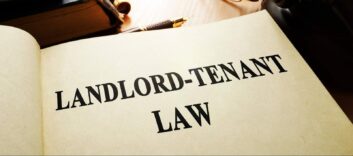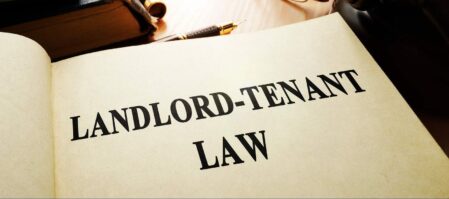Risk Management

Tenant Discrimination Laws, Trends, and Landlord Recommendations: Are you a member of a legally protected class? To answer that question, ask yourself, do I have a gender? Do I have a religion? How about a sexual orientation? An age? A family status?

Tenant Discrimination Laws, Trends, and Landlord Recommendations
Are you a member of a legally protected class? To answer that question, ask yourself, do I have a gender? Do I have a religion? How about a sexual orientation? An age? A family status? A race? A pet I have a deep emotional connection with? If you answered yes to any of those questions, then, yes, you are a member of a legally protected class. As my dad used to say, “You are unique and special. Just like everyone else.” An expanding definition of “disability” coupled with substantial increases in the operating budgets of government enforcement agencies are leading to record numbers of housing discrimination complaints against property managers and landlords.
The Federal Fair Housing Act is intended to prohibit illegal housing discrimination against the buyer or renter of a property and promote residential integration. When the Fair Housing Act was first passed, it only prohibited discrimination based on race, color, religion, sex and national origin. A 1988 amendment to added disability and families with children under the age of 18 to the list of protected classes. In June of 2015, the Supreme Court held that the law also allows for claims involving situations that have a discriminatory effect, even if there is no discriminatory intent. Activities such as advertising only in a Hispanic targeted newspaper or only in a certain section of town have been found to violate the law. Housing discrimination law compliance is a bigger issue in the U.S. than most property managers and landlords understand it to be.
“The Fair Housing Act” and “The Americans with Disabilities Act” have similar definitions of a disabled person: a person who has a physical or mental impairment that substantially limits one or more major life activities, or a person who has a history or record of such an impairment, or a person who is perceived by others as having an impairment. Visible disabilities, such as those of a wheelchair bound tenant or a blind tenant, are easier for property managers to acknowledge and accommodate.
Lesser apparent or invisible disabilities are far more difficult to identify and accommodate. Yet, reasonable accommodation without question is required. For example, a military veteran suffering from Post-Traumatic Stress Disorder who needs the services of a Chow to reduce anxiety or a person who has seizures and relies on the services of a German Shepherd that can predict the onset of those seizures both suffer from invisible disabilities. Both tenants are legally allowed to keep their pets despite any property management rules prohibiting such animals. Because invisible disabilities are both more difficult to recognize and more likely to be fraudulently claimed by tenants, there is a greater likelihood property managers may initially deny such tenants reasonable accommodations. Such denials may cause more discrimination complaints.
Worse yet for property managers, evolving ideas of what constitutes a disability are creating new problems. Recent court cases ruled that hoarding and the use of medical marijuana were considered disabilities. These disabilities create special problems for property managers because they pose additional safety hazards when tenants with these disabilities reside close to other tenants. For example, marijuana users produce toxic second hand smoke and hoarders pose a fire risk. While discrimination is still illegal in these situations, property managers may put in reasonable limitations and controls to address safety concerns. For example, someone who claims that their pit bull helps them manage anxiety may still be required to remove the dog from the premises if the dog attacks or attempts to attack another person.
It brings added urgency to any property manager when they read about an increase in the operating budget for the agencies that are tasked with enforcing these laws and investigating these complaints. These agencies are searching hard for discrimination complaints. Enforcement of the Fair Housing Act is administered by the Office of Fair Housing and Equal Opportunity and overseen by HUD. Ninety five separate fair housing and nonprofit organizations whose mission is to find and eliminate housing discrimination were recently awarded $38.5 million from the government.
These agencies’ budgets are ultimately defined by how many complaints against landlords they find and help prosecute. Therefore, finding more violations is good for their business. So when they contact you as a property manager and claim they don’t favor either side of a housing dispute, be wary. The best practice when dealing with these investigators is to be polite, succinct, and let them know you’ll have someone in your organization reply in full. At that time, get help from a lawyer or other type of fair housing professional to help you properly respond.
It’s important that your property management team be well trained in Fair Housing and Discrimination laws. Periodically test your staff to see if they are in full compliance. Check to see that your sales and lease forms as well as your advertising comply with Fair Housing laws. Finally, as a failsafe measure, make sure that you have proper insurance in place (Tenant Discrimination or Employment Practices Liability Insurance with 3rd Party Coverage). Property managers and landlords are more predisposed to discrimination lawsuits than ever before.

Top 10 Mistakes Insuring a MHC: Failure to list/insure all your improvements on your policy. Many simply don’t include above ground utility infrastructure, signs, fences and smaller buildings. Undervaluing your property. Too often, people insure things based on its tax value or what the prior owner valued it at.

Top 10 Mistakes Insuring a MHC
- Failure to list/insure all your improvements on your policy. Many simply don’t include above ground utility infrastructure, signs, fences and smaller buildings.
- Undervaluing your property. Too often, people insure things based on its tax value or what the prior owner valued it at. For most regular construction buildings, start at $70/ft.
- I won’t insure y park owned homes because they aren’t worth a lot. A $10K loss might not be catastrophic, but if you lose 10 homes at $10K each in a single event, that’s too large of a loss to not seriously impair your long term investment.
- Buying insurance from a non-specialty agent. They don’t have the knowledge or insurance company contacts to get you the right coverage or a good premium.
- Not buying loss of Business Income and extended loss of business income coverage. Both are critical for park owners.
- Paying for the insurance of every contractor that works for you. If they don’t have insurance, your insurance company will pay their claims. Make them prove coverage with an appropriate Certificate of Insurance.
- Failure to include data breach and tenant discrimination coverage. These are large and growing loss drivers for park owners.
- Calling an employee and independent contractor. What functions and how they perform them define who is an employee. A simple contract stating otherwise won’t do it.
- Not buying Worker’s Comp when needed. Ands if you have employees you need workers compensation insurance. Employers are responsible for medical expenses and lost wages for up to life when employees are injured on the job.
- When you sell mobile homes, not including this coverage on your policy. You need general liability insurance that covers the park, any home sales, and all associated operations.

Stealth Auto Liability: Most of our manufactured home community and retail center operators don’t own a corporate vehicle or drive their own vehicles as a revenue generating part of their business. Nevertheless, most still have some auto liability risk.

Stealth Auto Liability
Most of our manufactured home community and retail center operators don’t own a corporate vehicle or drive their own vehicles as a revenue generating part of their business. Nevertheless, most still have some auto liability risk. Examples include owners or employees using their own vehicles to go to the bank, pick-up supplies, take customers to see property, etc. Any accident involving either a company owned vehicle or a vehicle owned by another while being used on a company-related task will result in your company’s involvement in any resulting accidents.
You can manage this risk by doing the following things: First, limit who can drive on company business. You don’t want every Lloyd and Harry driving all over town under your corporate banner. People love to sue business owners. Second, make sure you have either a corporate auto insurance policy or hired/non-owned auto liability coverage on your general liability insurance policy.

Planning for an Emergency: A recent report by a national small business council revealed that 80% of the small businesses significantly damaged by a major storm or other calamity that didn’t have a disaster recovery plan failed within a year of the disaster.

Planning for an Emergency
A recent report by a national small business council revealed that 80% of the small businesses significantly damaged by a major storm or other calamity that didn’t have a disaster recovery plan failed within a year of the disaster. As for those that did have a disaster recovery plan, only 20% failed. Here are five simple steps to creating a viable disaster recovery plan:
- Create a detailed key contact list. Include employees’ home and cell numbers, utility suppliers, your insurance company and agent, and key contractors such as debris removal companies, carpenters, electricians, and plumbers. Call ad secure help right away.
- Document all of your property and possessions with either pictures or a video. This information will be invaluable in the event of a major storm.
- Electronically back up all your computer data regularly. Keep the backup media or tape off premise.
- Have a back-up place from which to operate. Many businesses now have mutual agreements to temporarily assist the other in the event one’s place of business is unusable for some time.
- Visit with your account manager to discuss the coverage you have and might need in the event of a disaster.

Risk Transfer: “Risk Transfer” means making contractors who work for you responsible for their own negligence and mistakes. For example, if you hire an installer to setup a manufactured home for your customer and a faulty installation results in damage to the house or injury to its occupants, you not only want the installer to fix the problem, you want them to protect you

Risk Transfer
“Risk Transfer” means making contractors who work for you responsible for their own negligence and mistakes. For example, if you hire an installer to setup a manufactured home for your customer and a faulty installation results in damage to the house or injury to its occupants, you not only want the installer to fix the problem, you want them to protect you. Examples of independent contractors hired by community managers and retail centers include installers, transporters, a/c suppliers, electricians, tree trimmers, plumbers, landscapers, road maintenance companies, and home foundation companies.Ensure that your contractors take care of you by putting yourself in a legally strong position. Here’s how to do it. First, make sure that you use written contracts with all of your contractors. Contracts should say what you expect the contractor to do for you and should require the contractor to both defend and indemnify you in the event a demand is made by a third party due to the contractor’s work. Second, require that all contractors provide you with a “Certificate of Insurance” that names you as an additional insured on their general liability insurance policy. Third, keep a file for all contractors that work for you that includes the contract and certificate of insurance for at least five years after the contractor ceases working for you. In the long run, these business practices will save you a bundle of time and effort.

Community Management: The $20,000 Dog: It’s exciting. You just purchased a manufactured home community. It has fifty sites, 48 of which are occupied by home owing tenants paying $300/month in rent. You were pleased to purchase it for $960,000, or $20,000 per site.

Community Management: The $20,000 Dog
It’s exciting. You just purchased a manufactured home community. It has fifty sites, 48 of which are occupied by home owing tenants paying $300/month in rent. You were pleased to purchase it for $960,000, or $20,000 per site. And now that it’s time to begin managing the community, you discover three things: First, four of your tenants one large dogs (German Shepard, Pit Bull, Rottweiler, and a Chow). Second, your insurance agent has advised you that your insurance company strongly discourages allowing tenants to own such dogs and will non-renew or cancel your insurance if you don’t force the dogs out of the park. Third, all four dog owning tenants have nice homes, are good neighbors, pay their rent timely, manage their dogs well, and will leave if their dogs have to go. What do you do?
The standard answer is that you demand the dogs be removed, and hope you keep the tenants. Most insurance companies won’t underwrite a community owner with coverage that includes animal bites once they are aware vicious dog breeds are in the community. And if you do find an insurance company that will insure your property with these types of dogs in it, your insurance rates will increase dramatically. Historically, dog bites have been a source of a significant amount of the liability insurance losses suffered by community owners. Dog bites were the second largest cause of homeowners liability insurance losses in 2010. In January of this year, a pit bull attacked and killed a two year old in one of our client’s properties. The victim was the grandson of the dog’s owner.
If you only want to risk losing four quality tenants as a last resort, there are alternative risk control measures you can take that may satisfy both you and your insurance company that this dog is manageable. First, check with the prior management and other tenants about whether the dog(s) at issue have a history of aggressive behavior toward humans. A large vicious dog that has a history of biting a human, or attempting to bite one, can’t be tolerated and must be removed. Second, presuming the dog has no history of aggressive behavior toward humans, require the dog owner to sign a document in which they agree to defend and indemnify the park in the event a liability claim arises due to the dog. Third, require the tenant to purchase liability insurance and name the park as an additional insured. Mobile Home Owners liability insurance is inexpensive, usually about $100/yr for $300,000 in coverage. However, most mobile homeowners insurance companies won’t offer this coverage to someone who owns an aggressive dog breed. Thus, the tenant will most likely have to purchase “canine/dog liability insurance.” Such policies typically cost about $600/yr for $300,000 of coverage. At that point, the tenant can choose between their heart and their wallet. If you Google “Vicious dog liability insurance,” you will find companies that offer this coverage.
